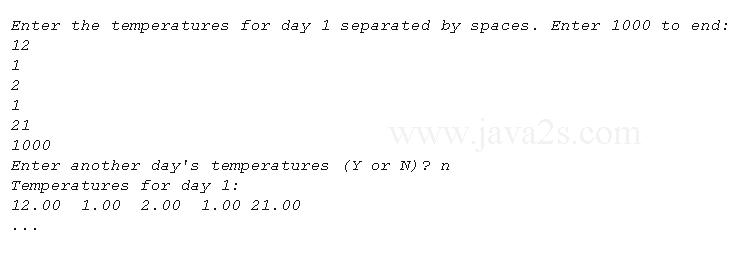A unique_ptr<T> object stores an address uniquely - C++ Data Type
C++ examples for Data Type:unique_ptr
Description
A unique_ptr<T> object stores an address uniquely
Demo Code
#include <iostream> #include <iomanip> #include <memory> // For smart pointers #include <vector> #include <locale> // For toupper() using std::vector; using std::shared_ptr; int main()//from w ww.jav a 2s.c o m { vector <shared_ptr<vector<double>>>records; // Temperature records by days int day {1}; // Day number char answer {}; // Response to prompt double t {}; // A temperature while (true) // Collect temperatures by day { auto pDay = std::make_shared<vector<double>>(); records.push_back(pDay); // Save pointer in records vector std::cout << "Enter the temperatures for day " << day++ << " separated by spaces. Enter 1000 to end:\n"; while (true) { std::cin >>t; if (t == 1000.0) break; pDay->push_back(t); } std::cout << "Enter another day's temperatures (Y or N)? "; std::cin >>answer; if (toupper(answer) == 'N') break; } double total{}; int count{}; day = 1; std::cout << std::fixed << std::setprecision(2) << std::endl; for (auto record : records) { std::cout << "\nTemperatures for day " << day++ << ":\n"; for (auto temp : *record) { total += temp; std::cout << std::setw(6) << temp; if (++count % 5 == 0) std::cout << std::endl; } std::cout << "\nAverage temperature: " << total / count << std::endl; total = 0.0; count = 0; } }
Result
